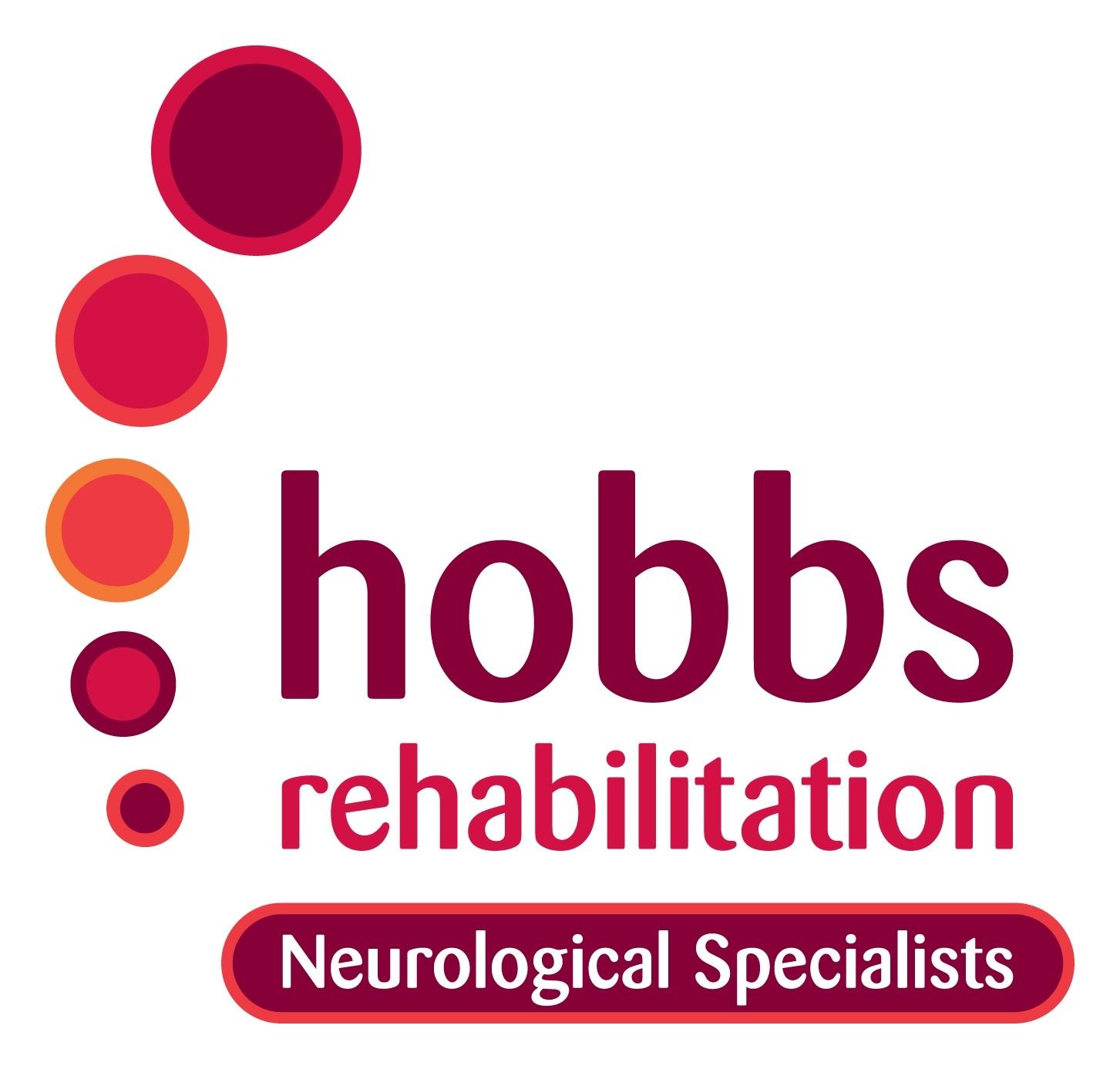Nov 12
MiNT UK 2025
In October 2025, many of you joined us for our fourth MiNT UK conference, and it was a brilliant day full of fascinating discussions, inspiring talks, and exciting demonstrations of wonderful pieces of neurotechnology. Our theme this year was “Neurotechnology in Practice: Measuring Impact on Patient Outcomes”, and this guided the entire day.
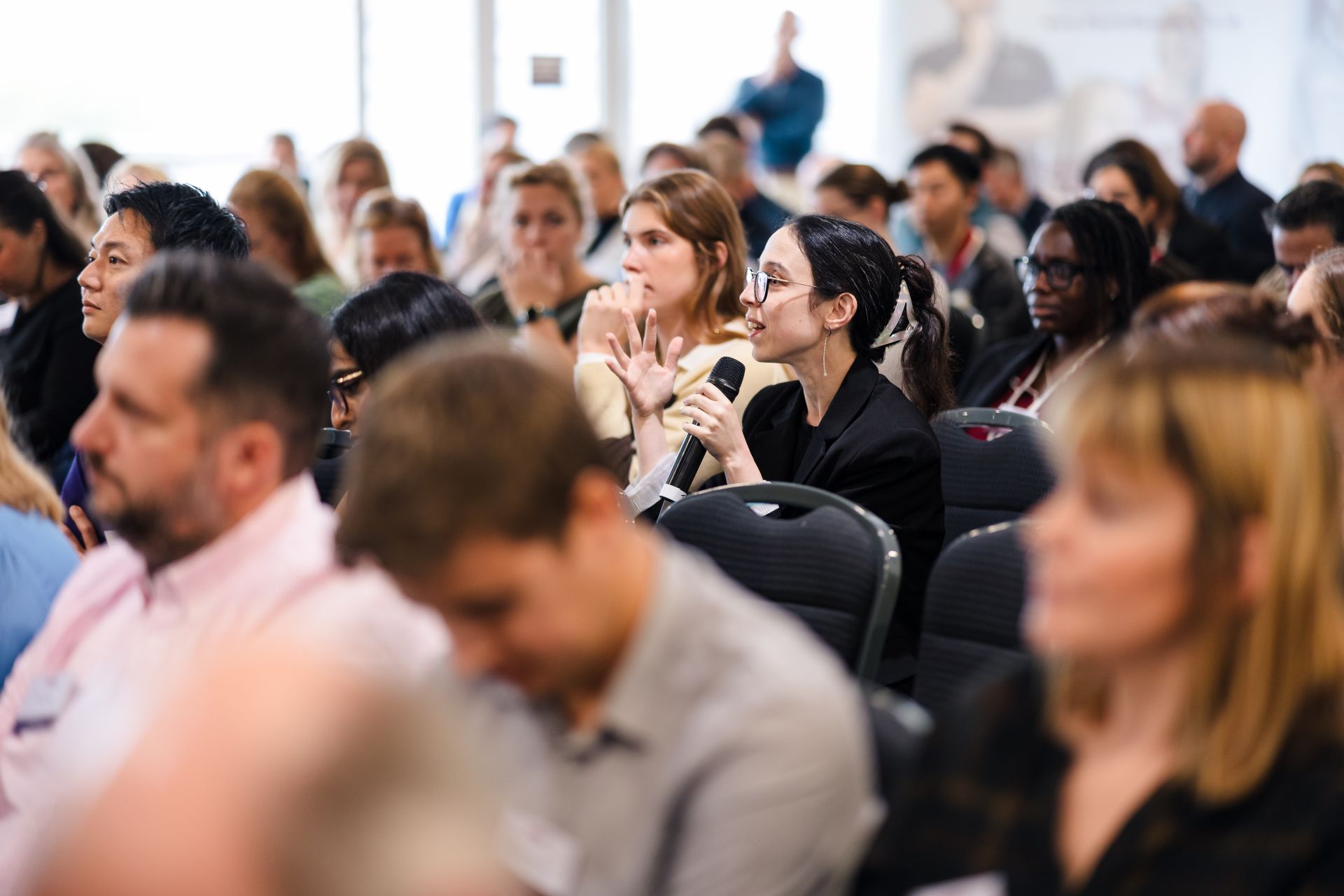
In hosting MiNT UK 2025, we wanted to not only hold a great conference, but also create a space where some of the best minds in neurorehabilitation could meet and share ideas about its current landscape, and what its future could look like. It was an excellent opportunity for everyone to understand where neurotechnology, rehabilitation, clinical insight, and human stories come together, and how we could collaborate in all these areas in order to create the best possible environment for rehabilitation. We have learnt so much from this conference, and are so grateful to our exhibitors, innovators, and especially our Supporting Partner, Guldmann, for their continued support for MiNT, and for all the valuable feedback they have given us. We plan to use this feedback to make future events the best they possibly can be.
We feel so privileged to have created a space where individuals from so many different areas in neurotech could come together and create connections, and begin to close the gap between innovation and clinical practice. The boundary between research and development, and real-world care, is disappearing. It is being replaced by a shared commitment to make neurotechnology work for clinicians, with patients, and in everyday practice.
We had some fantastic talks from lots of brilliant people in the industry, from clinicians to innovators, researchers to patients.
- In Laura Marriott and Lizzie Mills’ session, we saw how The MiNT Academy’s Level 2 modules and integration of the logbook are creating a framework to close the loop between patient, practitioner, and product.
- Dennis Viet’s talk, “Empowering Therapists - The Importance of Contextualised Data in Rehab” showed the practical side of how therapists can use real-time, meaningful data, using products such as MIDAS and Abilitate.
- Mark McIntosh delivered a thought-provoking session that challenged us to reconsider the ways in which technology and rehabilitation can intersect in the field of amputation. He demonstrated how we can combine neurotechnologies to not only enhance functional outcomes, but also provide richer, more meaningful ways to measure progress. His session reminded us that neurotechnology isn't just an add-on, but a bridge between clinical intuition, and measurable improvement.
- The session from Dr. Louise Johnson, “Rehabilitation in the NHS: Can Robots Do It Better?”, gave us an insight to where robotics can enhance acute stroke care, and where leadership, culture, and workflow remain the real hurdles.
- Barry’s Bar, was an informal chat with Barry Richards, Dr. Niall McCann, and Mark Pollock about finding purpose after a spinal injury. It reminded us that behind every innovation is a human journey with uncertainty, resilience, adaptation, and hope.
- Dr. Amit Pujari and Laura Jones presented an innovative study which explored how non-invasive random stimuli can be used to enhance light touch sensation in people living with chronic stroke. Their session shed light on a novel approach to sensory rehabilitation, one which uses gentle, carefully modulated simulation to retrain neural pathways and improve tactile awareness. They demonstrated not only measurable improvements in sensation, but also meaningful feedback from patients describing how these changes positively influenced their daily lives.
- Professor Stuart Baker delivered a fascinating and deeply insightful exploration into the neural mechanisms that underpin recovery after stroke. He reminded us that while stroke causes permanent loss of neural tissue, the brain and spinal cord possess remarkable adaptive capacity. His talk unpacked the delicate balance between beneficial plasticity and maladaptive reorganisation, highlighting how understanding these mechanisms can guide more targeted and effective interventions.
- Alison Wildt and Professor Rui Loureiro delivered an inspiring session on the National Rehabilitation Centre, highlighting how clinical excellence and cutting-edge research are being combined to transform rehabilitation across the UK. They showcased the NRC’s mission to expand in-patient capacity, improve regional coordination, enhance access beyond neurological conditions, and translate large-scale, clinically driven research into tangible patient outcomes.
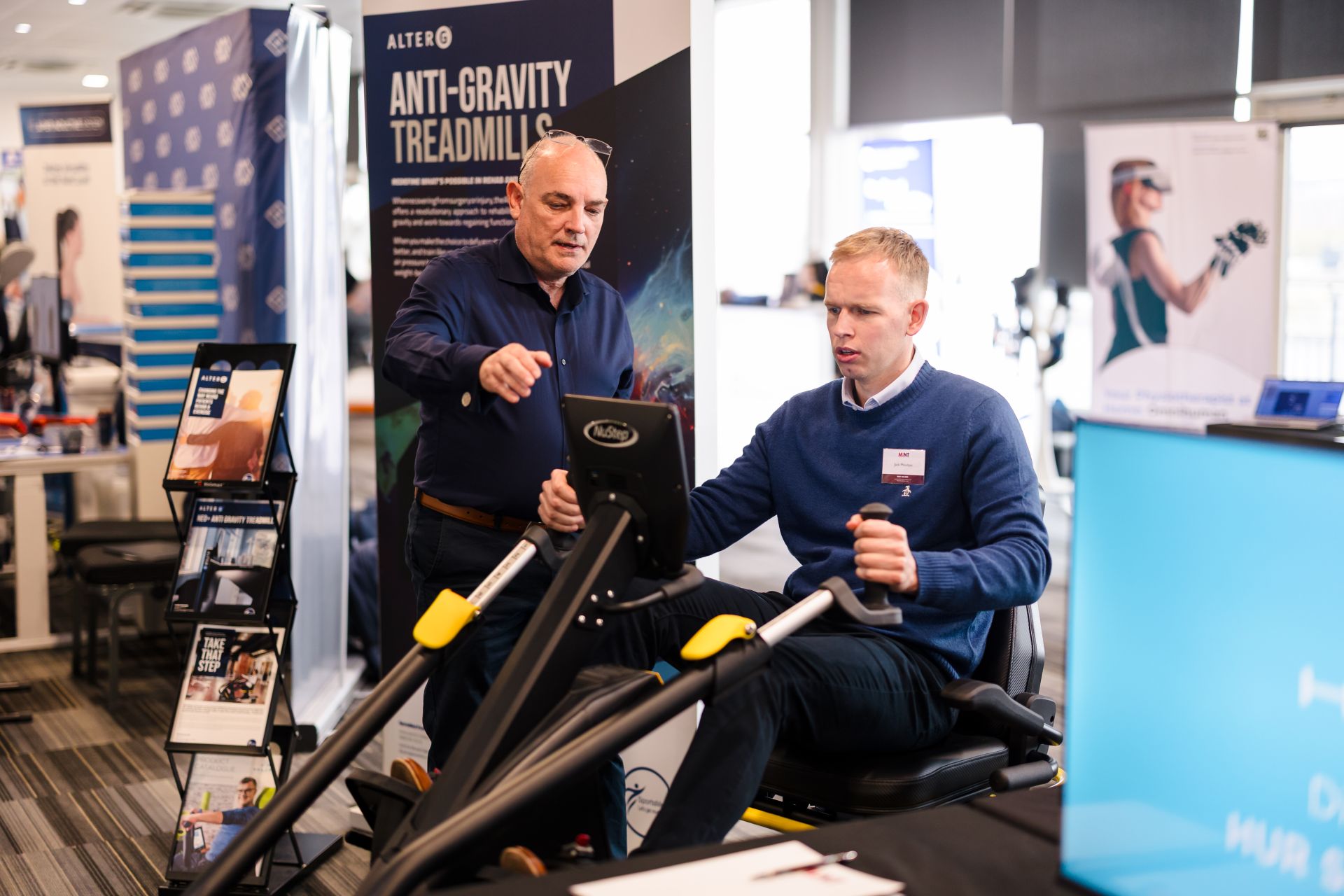
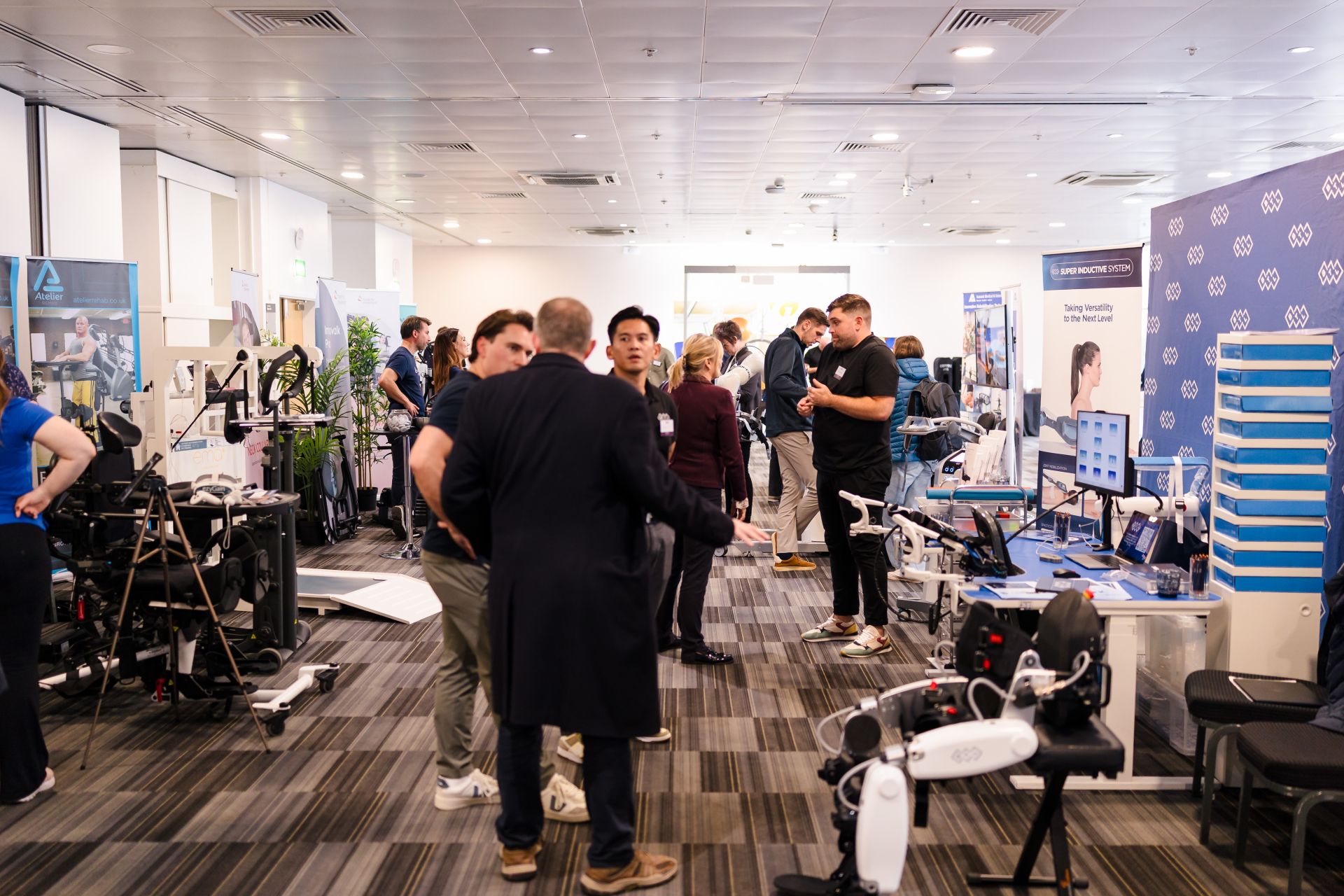
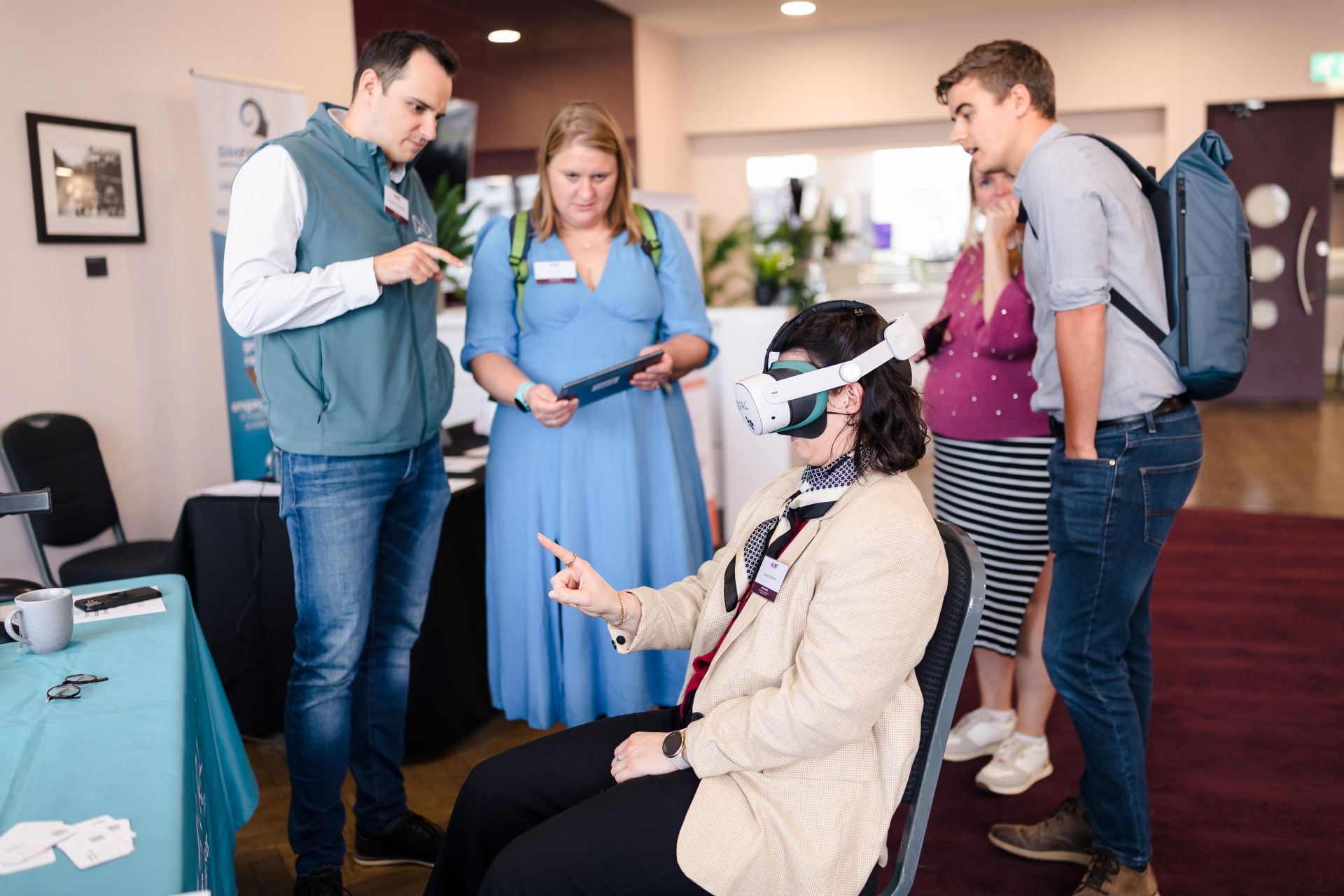
We were also lucky enough to have two fascinating workshops from experts in their respective fields: Chrissy Bibby and Jen Mellows hosted “In Exploring the Evidence Base for the Use of Neurotechnology in Dysphagia”, while Rose Beacham and Rob Howland lead the “Explorative Workshop in the Interdisciplinary Clinical Application of a Driving Simulator in Neurorehabilitation”. Chrissy and Jen guided us through the current evidence, clinical applications, and research gaps in dysphagia care, which highlighted how neurotechnology can enhance assessment, management, and interdisciplinary rehabilitation. Rose and Rob introduced the use of driving simulators as a neurorehabilitation tool, showing how activity analysis can address cognitive, physical, and sensory deficits, while fostering co-design between clinicians and technology developers.
Our exhibition and innovator spaces were more than just a showroom - they were a thriving space of co-creation where all of our attendees were exploring the exciting technology on offer, sharing feedback, and imagining future possibilities.
It is clear that MiNT UK has become a microcosm of a healthy ecosystem that is defined by collaboration and partnerships built between clinicians, technology developers, case managers, regulatory voices, and researchers. We don’t want just outputs; we want outcomes that matter. When patients, clinicians, and people in the industry all align around a common goal, we begin to tip the scale towards real impact.
Thank you so much to those of you who came along. We hope you left feeling inspired, energised, and ready to work towards a brighter future.
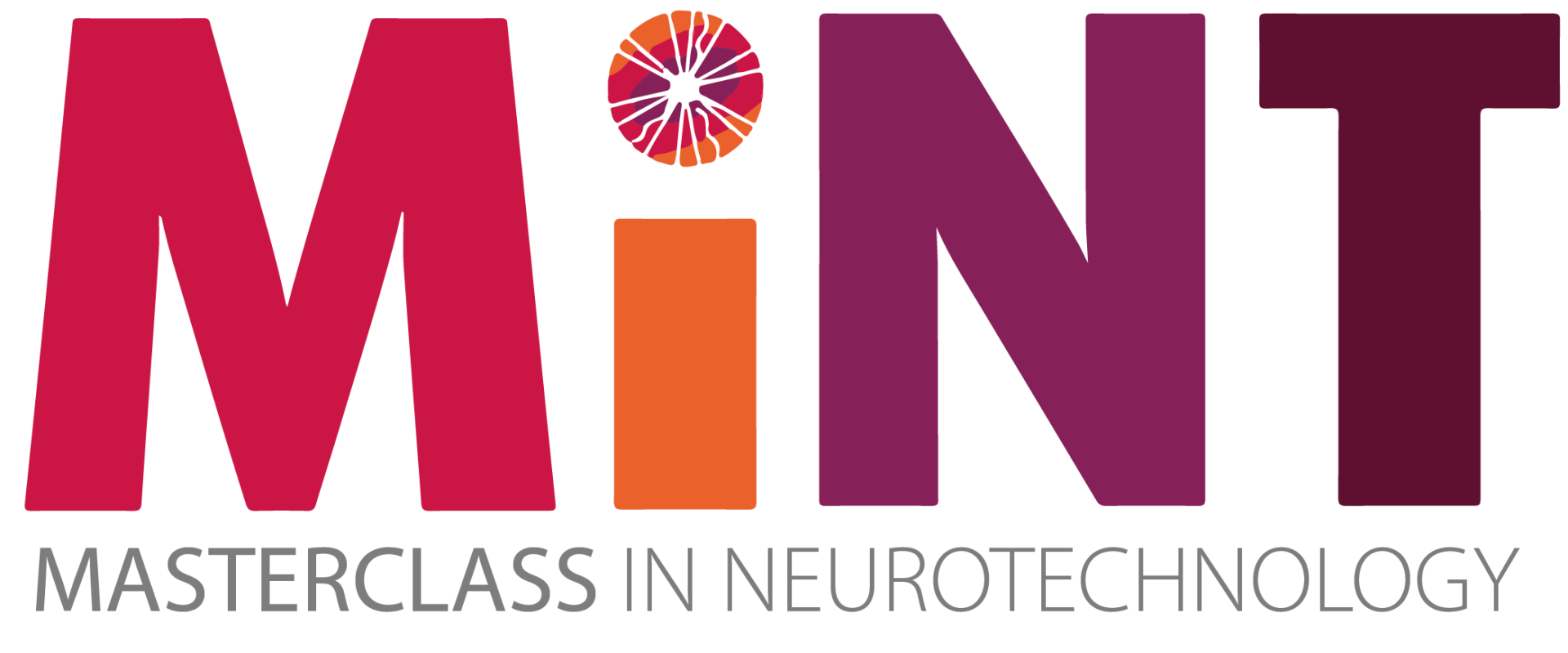
Connect with us
Copyright© 2022 Hobbs Rehabilitation LTD
Alison Watt
Head of Clinical Operations
Alison is Head of Clinical Operations for The MiNT Academy. With over 10 years of clinical experience within specialist neurological services, Alison previously worked in the NHS specialising in stroke and neurorehabilitation.
As a previous NHS AHP Ward Manager, Alison has always worked within innovative therapy roles. This continues at The MiNT Academy, a growing neurotechnology platform combining clinical education and product development.
As a previous NHS AHP Ward Manager, Alison has always worked within innovative therapy roles. This continues at The MiNT Academy, a growing neurotechnology platform combining clinical education and product development.
Alison coordinates research, development and education activities to enable increased accessibility to clinically effective devices.
As Principle Investigator in technology trials, she has aided the development of devices from concept to market, with recent focusses on Virtual Reality and Exoskeletons. Alison has presented at and organised numerous national and international conferences, including as MiNT Chair at RehabWeek 2022. She has also completed a Post-Graduate Certificate in Medical Education and lectures at multiple UK academic institutions.
Alongside this, Alison works clinically at Hobbs Rehabilitation Intensive Neurotherapy Centre in Bristol, combining the use of therapy devices with conventional hands-on treatment, for outpatients with a variety of neurological conditions. Alison uses all of her roles to passionately drive forward the use of neurotechnology in clinical practice to optimise opportunities and outcomes for patients.
As Principle Investigator in technology trials, she has aided the development of devices from concept to market, with recent focusses on Virtual Reality and Exoskeletons. Alison has presented at and organised numerous national and international conferences, including as MiNT Chair at RehabWeek 2022. She has also completed a Post-Graduate Certificate in Medical Education and lectures at multiple UK academic institutions.
Alongside this, Alison works clinically at Hobbs Rehabilitation Intensive Neurotherapy Centre in Bristol, combining the use of therapy devices with conventional hands-on treatment, for outpatients with a variety of neurological conditions. Alison uses all of her roles to passionately drive forward the use of neurotechnology in clinical practice to optimise opportunities and outcomes for patients.
Helen Hobbs
The MiNT Academy Development Team
Helen is a specialist neurological physiotherapist with over 25 years of specialist clinical experience and extensive clinical skills including advanced Bobath training. She has a special interest inclinical education, training and research. Helen has held postgraduate clinical training roles at both Kings College NHS Hospital London Neuroscience Centre and Southampton University Hospital NHS Trust before establishing Hobbs Rehabilitation in 2005.
Helen's teaching and leadership skills resulted in international scholarships and fellowships taking Helen to the USA and South Africa. She has presented both nationally and internationally. Helen has close links with several academic institutions including Southampton, Imperial College, Loughborough , Portsmouth and Winchester Universities to provide clinical leadership for the design of future healthcare technologies and research projects.
Her publications have included the effects of robotic assisted gait training on vascular health in strokes and spinal cord injured patients and the European rehabilitation guidelines for MS patients post stem cell transplant.
Amy Dennis-Jones
The MiNT Academy Research Lead
Amy has over 20 years experience working within the field of Neurological rehabilitation. She has worked with a variety of settings capturing the full rehabilitation pathway from acute through to the community.
Since working for Hobbs Rehabilitation in 2015, Amy has worked with an array of neurotechnologies and is a trained Rewalk exoskeleton clinician. She has presented at varying conference and study days, and is on the local committee for ACPIN, a specialist interest group for physiotherapists working in Neurology.
Amy's position within Hobbs Rehabilitation has evolved into a split clinical and research role. She is part of the core development team working on MiNT, an innovative neurotechnology platform combining clinical education and product development as well as leading on research projects and further collaborations.
Outside of physiotherapy, Amy is a qualified yoga teacher and combines her experience with rehabilitation to teach chair/adaptive yoga classes.
Chrissy Bibby
The MiNT Academy Events Lead
Chrissy has worked in the field of adult acquired neurological speech and language therapy for over 15 years, initially in the NHS before joining Hobbs Rehabilitation, where she leads the Speech & Language therapy team. Clinically, she has a special interest in motor speech disorders and rehabilitation of the facial nerve.
Chrissy trained as a teacher before embarking on her career in neurological rehabilitation and enjoys using her teaching skills in all areas of her work with Hobbs Rehabilitation and MiNT.
As Events Lead for The MiNT Academy, Chrissy is embracing the opportunity to discuss with fellow clinicians, academics and industry partners the benefits of using neurotechnology with our communication impaired clients, while encouraging further development in this vital area.
Outside of speech and language therapy, Chrissy enjoys swimming, singing with her local rock choir, baking, sewing, and camping with her family.
Chrissy trained as a teacher before embarking on her career in neurological rehabilitation and enjoys using her teaching skills in all areas of her work with Hobbs Rehabilitation and MiNT.
As Events Lead for The MiNT Academy, Chrissy is embracing the opportunity to discuss with fellow clinicians, academics and industry partners the benefits of using neurotechnology with our communication impaired clients, while encouraging further development in this vital area.
Outside of speech and language therapy, Chrissy enjoys swimming, singing with her local rock choir, baking, sewing, and camping with her family.
Laura Marriott
The MiNT Academy Education Lead
Laura is a specialist Neurological Occupational Therapist with 15 years of experience, over 12 years of which is in the neurological sector. Laura has worked in the NHS from acute care through to community rehabilitation and outpatients and now works in the private sector where she is the lead Occupational Therapist for Hobbs Intensive outpatient rehabilitation service, coordinating intensive rehabilitation packages and treating patients with complex neurological requirements.
Her role within Hobbs has evolved and she has split clinical and research responsibilities. She is part of the MiNT Academy Development Team who have delivered an innovative neurotechnology platform combining clinical education and product development. Her role also involves leading on research projects and further collaborations. Laura has expert clinical skills used to implement neuro assistive and rehabilitation technology into functional contexts building the links between the companies and the patients. Laura presented at Virtual RehabWeek 2021 and is excited to be presenting at RehabWeek 2022 in Rotterdam, showcasing the merits and application of collaboration between skilled clinicians and engineers to create a device that has longevity with both clinicians and patients alike.
Outside of Hobbs Laura enjoys a busy family life, hiking, roller skating and painting.
Lizzie Williams
The MiNT Academy Development Team
Lizzie is a Specialist Neurological Physiotherapist working at Hobbs Rehabilitation since May 2020. She also has a background in orthopaedics, frailty and inpatient rehabilitation. Lizzie jumped at the opportunity to be involved in The MiNT Academy to combine her interest in technology and love for providing high quality rehabilitation for patients. Lizzie brings the perspective of a physiotherapist who routinely utilises neurotechnology with patients as well as teaching and supporting other clinicians in embedding it into practice.
Rachael Edwards
The MiNT Academy Development Team
Rachael Edwards developed a specialist interest in the role of technology in upper limb neurorehabilitation, whilst working as an Occupational Therapist on the upper limb program at The National Hospital for Neurology and Neurosurgery, Queen Square.
Rachael has relocated to Bristol and is setting up an Occupational Therapy service at Hobbs Rehabilitation Intensive Neurotherapy Centre, where she continues to explore the use of technology to support delivering intensive upper limb rehabilitation.
Louis Martinelli
The MiNT Academy Development Team
With degrees in Sport & Exercise Science (BSc) and Physiotherapy (MSc pre-registration), Louis has over 15 years’ experience of working in neurological rehabilitation.
Trained in the Ekso GT, ReWalk and the Able Exoskeleton, Louis has 10 years’ of hands-on experience with these types of devices with a variety of medical conditions at Hobbs Rehabilitation. In this time, he also trialed a number of other exoskeletons on the market with the aim of exploring what fits the clinical and functional needs of the patient.
Louis has helped establish a research partnership between Hobbs Rehabilitation with The University of Winchester, which in 2019 published an article on the effects exoskeleton rehabilitation can have on the vascular system in the Journal of Spinal Cord Medicine. Louis has also contributed to publications for the Bionic Leg (Clinical Rehabilitation, 2020) and more recently the GMove Suit (PLOS One, 2025) with the University of Southampton.
In 2022 Louis was on the expert panel for the M.O.T.I.O.N project, exploring mechanical orthosis for children with neurological disorders. He is currently project managing the UK government funded, multi centered, Eurostars Project FREEDOM which looks to establish the first exoskeleton designed for people with Multiple Sclerosis.
Trained in the Ekso GT, ReWalk and the Able Exoskeleton, Louis has 10 years’ of hands-on experience with these types of devices with a variety of medical conditions at Hobbs Rehabilitation. In this time, he also trialed a number of other exoskeletons on the market with the aim of exploring what fits the clinical and functional needs of the patient.
Louis has helped establish a research partnership between Hobbs Rehabilitation with The University of Winchester, which in 2019 published an article on the effects exoskeleton rehabilitation can have on the vascular system in the Journal of Spinal Cord Medicine. Louis has also contributed to publications for the Bionic Leg (Clinical Rehabilitation, 2020) and more recently the GMove Suit (PLOS One, 2025) with the University of Southampton.
In 2022 Louis was on the expert panel for the M.O.T.I.O.N project, exploring mechanical orthosis for children with neurological disorders. He is currently project managing the UK government funded, multi centered, Eurostars Project FREEDOM which looks to establish the first exoskeleton designed for people with Multiple Sclerosis.
Barry Richards
Head of Commercial Operations
Barry brings extensive expertise in the medical device industry and healthcare markets from across Europe, North America, and Asia Pacific. Renowned as a subject matter expert, he possesses deep knowledge of exoskeleton technology and the neurological MedTech rehabilitation sector.
With over a decade of commercial experience, Barry has worked with leading neurological rehabilitation MedTech companies in various roles, including clinical, business development, market access, and commercial operations. He has successfully assisted multiple organisations in shaping their business development, sales, marketing, and clinical strategy plans at different stages of commercialisation.
With over a decade of commercial experience, Barry has worked with leading neurological rehabilitation MedTech companies in various roles, including clinical, business development, market access, and commercial operations. He has successfully assisted multiple organisations in shaping their business development, sales, marketing, and clinical strategy plans at different stages of commercialisation.
Barry has held director-level and senior management positions at both global and European levels. He also has a strong clinical background in physiotherapy, with significant experience in the neurological rehabilitation field, and demonstrates a high level of competency in operating advanced technologies.
